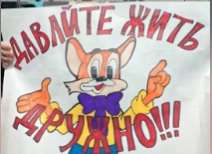The Volokh Conspiracy
Mostly law professors | Sometimes contrarian | Often libertarian | Always independent
Man Arrested in St. Petersburg for Holding Up Sign of a Cartoon Character's Tag Line, "Let's All Get Along!"
There's a lovely and popular Russian cartoon series called Kot Leopold, which means Leopold the Cat. To quote the accurate Wikipedia summary,
Leopold the Cat (Russian: Кот Леопольд, Kot Leopold) is a Soviet/Russian animated short film series about a good-natured and prudent cat, Leopold. Leopold always wears a bow tie even when swimming. Throughout the series, he has to deal with two mischievous mice …. Leopold's catchphrase is "Guys, let's all get along" (Russian: Ребята, давайте жить дружно)….
(I leave to readers to decide whether there's something deeply significant about Tom and Jerry having the mouse always be the winner, and Kot Leopold having the cat always be the winner. Note also that the literal translation is "Guys, let's live amicably," but "let's all get along" is a good idiomatic translation.)
Sunday, Gazeta.ru (Arseniy Rogozianskiy) reported that a man was arrested for holding a sign depicting Leopold and the final words of his catchphrase, "let's all get along"; the sign appears to be the one in the picture above. The man has been identified as Lev Sokolov; my hat would be off to him, if I wore a hat. The article states that, according to news accounts (apparently based on Sokolov's own comments), Sokolov was questioned about his job, his military service, and his views of the "special military operation" in Ukraine. Other Russian-language sites report the story as well (e.g., Kommersant.ru), and there's also the video I include above.
The music in the YouTube video is apparently coming from a street musician who was there when Sokolov was arrested; it's Boris Grebenshchikov's / Aquarium's performance of "Golden City" (more at Wikipedia). Grebenshchikov, a prominent Russian musician, has emerged as a noted opponent of Russia's invasion of Ukraine; I have no idea whether the street musician deliberately chose the song on occasion of the arrest, or of the underlying protest.




Show Comments (18)